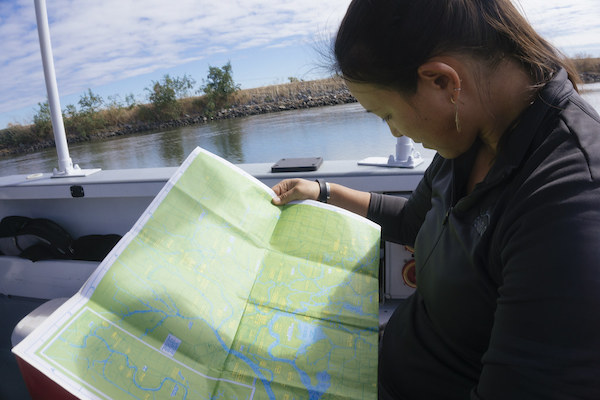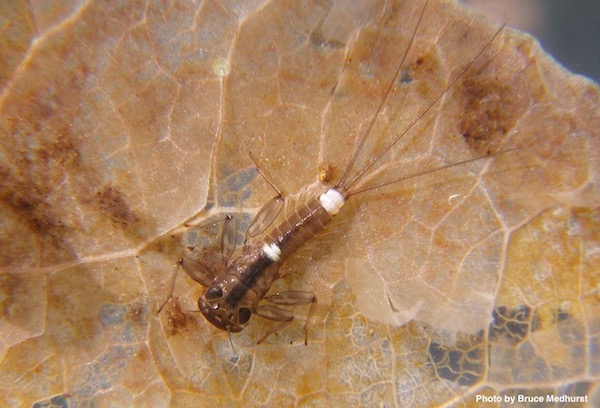Long Range Fish Report
From Sportfishing
From Sportfishing
Fish Report for 7-22-2019

Photo Credit: Courtesy of FishBio
Discovering Delta Data Online
7-22-2019
FISHBIO
The Sacramento-San Joaquin Delta is arguably the most extensively studied and monitored ecosystem in the world. This has generated mountains of data on everything from the locations of the smallest fish to the water quality conditions of the largest reservoir. Knowing where to access the most up-to-date information can be a real challenge, but fortunately several online dashboards can help regulators, scientists, managers, and stakeholders alike seek out the information they need. These websites are SacPAS (Central Valley Prediction and Assessment of Salmon), the California Data Exchange Center (CDEC), and Bay-Delta Live. Each of these web portals offers a treasure trove of Delta data, each with its own specialties and limitations. Here we present a roadmap of these three online resources, including some of the data they provide on fisheries, hydrology, and climate, as well as unique features of each.
Fisheries monitoring is essential for understanding the effects of water management practices, and of the three portals, SacPAS is undeniably the most fish-centric. Although it focuses on only a select few species – Chinook salmon (Oncorhynchus tshawytscha) and steelhead (O. mykiss) – the data it provides on these salmonids is extensive. It is the only one of the portals that includes smolt-to-adult survival data from both federal and state hatcheries, adult escapement data, and models to estimate spawning to emergenceand migration. It also provides data on salmonid salvage at State Water Project and Central Valley Project Delta Fish Facilities, as well as in-depth coverage of salmonid counts at important monitoring stations like the Red Bluff Diversion Dam. SacPAS has somewhat less hydrological and climate data than the other two portals, but does present basic water quality data (such as water temperature, turbidity, and dissolved oxygen) at select sites, as well as reservoir and basin conditions. Given its focus on salmonids, the main climate data on SacPAS is temperature target analyses for watersheds important to salmon. It’s worth noting that SacPAS is the most technical of the online resources, and the information it contains, though valuable, may be harder for most people to interpret than that presented by the other two websites.
Monitoring the amount and quality of water in the Sacramento-San Joaquin Delta is highly important for managers and regulators. All three of the portals provide a considerable amount of hydrology and water quality data, but the CDEC is the most complete resource on this topic. The other two portals draw their data from a subset of the CDEC’s 2,603 monitoring stations throughout California, whereas the CDEC presents information from all stations. This portal offers data on all water quality parameters and reservoir operations, and is the only one of the sites that provides extensive forecasting for streamflow, snowmelt, and river stage, as well as seasonal and monthly flow summaries and approximate water travel times. It also includes climate-related information that isn’t available on the other sites, including real time rainfall and monthly precipitation summaries by river basin.
Perhaps the most complete and accessible of the three portals is Bay-Delta Live, which provides extensive fisheries, hydrology, and climate data. It includes information on the same fisheries monitoring sites as SacPAS, but with the addition of data on non-salmonid species, and information from the Delta Juvenile Fish Monitoring Program (DJFMP). It also provides data from the Enhanced Delta Smelt Monitoring Program (EDSM), including daily reports and maps. Much like SacPAS, Bay-Delta Live has information on fish salvage operations, but includes non-salmonids and presents this data in the context of water exports, and also offers catch indices for species of management concern. It also has extensive hydrological data, with up to date water operations data, detailed water quality information, a Sacramento River forecast, and Delta tidal predictions. Notably, it is the only portal that provides the location of the X2 salinity measurement, which is an important metric for managers and regulators. Bay-Delta Live also provides a considerable amount of climate-related information, including accumulated precipitation, extensive data on snowpack, and drought conditions. In keeping with its user-friendly approach, it has maps and summaries, a project data dashboard, a web GIS map with searchable layers, and data portals for relevant work groups.
While there is no one-stop-shop for all the data being collected in the Sacramento-San Joaquin Delta. these three web portals are excellent resources for everyone from the curious citizen to the expert hydrologist. Wading through the oceans of information on these websites may seem daunting, but fortunately all three have a data catalogue and query system to help find what you need. Communicating findings and sharing data are some of the biggest obstacles facing those who study and manage a system as large and complex as the Delta, and these online resources go a long way toward overcoming that challenge.
FISHBIO is a dedicated group of research scientists, engineers, and technicians that specialize in counting, tracking, and analyzing trends in fish and wildlife populations throughout the world. An expert staff, technical capacity, and state-of-the-art equipment make FISHBIO a trailblazer in aquatic research. For more information, please visit FISHBIO.com
< Previous Report Next Report >
More Reports

7-15-2019
Of the four runs of Chinook salmon that inhabit the Central Valley, winter-run historically had the most daunting journey to...... Read More

7-8-2019
Small headwater streams at high elevations may be mostly inaccessible to fish, but they still teem with aquatic life. Benthic...... Read More

LongRangeSportfishing.net © 2025. All Rights Reserved.
Website Hosting and Design provided by TECK.net
Website Hosting and Design provided by TECK.net